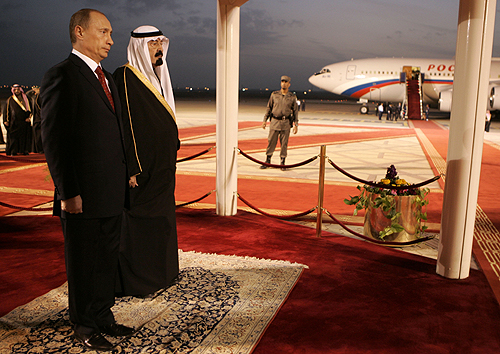".......the most significant Russian arms deal in the Middle East since the Soviet Union transferred SA-2s to Nasser's Egypt...... part of a larger process that leads to a significant realignment in the external relations of both parties......In all, the Saudi market may absorb up to $7 billion worth of Russian equipment in the future.The precise timing for the deal seems to have been guided by the worsening Iran nuclear crisis and the increasing enmity between the Iranians and the Saudis. The Saudi defense requirements also come at a time when Russian newspapers are awash with reports of the monetary loss -- in the billion-dollar range -- that Moscow must incur on the sale of S-300 air defense systems to Iran. That deal has been stalled due to pressure from Washington and Tel Aviv. Clearly, handsome compensation seems to be in the pipeline from Saudi quarters.Beyond the Iranian angle lies the Saudi need to diversify its sources of military equipment and thereby raise its bargaining power as a buyer. With the deal, Russia has beaten out the French, who have fallen out of favor lately with the Saudi establishment, especially since King Abdullah has been directly overseeing weapons procurement. The French practice of bundling additional weapons not sought by the buyer in a consolidated package has irked the Saudis. The turn to Russia effectively thwarts French pressure to buy weapons that the Saudis do not need, allowing them to focus on those that they do.Saudi Arabia also seems to have responded favorably to Russian feelers with respect to coordinating production and pricing on the international oil market. These two countries lead the world in oil exports and have huge reserves of gas as well. In the future, the Saudis may provide a bridge for the Russians to OPEC.From the Kremlin's point of view this deal represents an immense leg up for the Russian military-industrial complex, and a possible inroads with a country known to have access to key U.S. and European defense technology. Also, beating out the French in the defense realm might give Moscow a leg up in the nuclear sweepstakes as well, given that Riyadh seems set to debut nuclear energy in the kingdom.There might also be an Indian role somewhere in all of this. India has in the past served as a parts supplier and maintenance station for Russian hardware operated by countries in its neighborhood.... It is conceivable that given the recent upturn in Indo-Saudi relations, the latter may also look towards India for keeping future Russian origin weapons up to speed. India may also help the Saudis in setting up Russian-origin nuclear reactors.Indo-Saudi ties have experienced a drastic improvement since King Abdullah's visit to India in 2006. On the other hand, India and Iran have been steadily drifting apart, ever since India's anti-Iran vote at the IAEA in 2007 and amid differences over the Iran-Pakistan-India pipeline. Iran's increasingly bellicose statements on Israel and its Holocaust denial have made the relationship a difficult one for India. Israel, after all, is a "special" supplier of strategic technologies to India, and New Delhi cannot afford to jeopardize this relationship. Moreover, another nuclear-armed nation in the vicinity is hardly in India's interests.Saudi Arabia can offer many of the same benefits to India that Iran can, and seems to have managed its relationship with Israel decently in the recent past. Indeed, Saudi Arabia has emerged as the single largest source of Indian petroleum imports and may become a key recipient of Indian IT exports in the future.The Kremlin is also increasingly taking Israeli sensitivities into account. One of the main reasons for this is that a lot of Russian equipment can be made "hotter" through the replacement of Russian electronics and sensors with those from Israel. Indeed, Indian military imports from Russia increasingly contain India-specific Israeli inputs. Years of operating captured Arab-owned Soviet equipment has given Israel an amazing niche capability to integrate its own technology with Russian military architecture....Irrespective of whether the Obama administration succeeds in bringing Iran around, it is clear that both Washington's partners and rivals are hedging against Iran's uncertain trajectory. In fact, in the event of a U.S.-Iran rapprochement, Riyadh and Moscow may find themselves even more irresistibly drawn towards each other."
"'America is something that can be easily moved. Moved to the right direction.They won’t get in our way'" Benjamin Netanyahu
Tuesday, November 10, 2009
Saudi Arabia & Moscow "taking Israeli sensitivities into account"...
Subscribe to:
Post Comments (Atom)

No comments:
Post a Comment